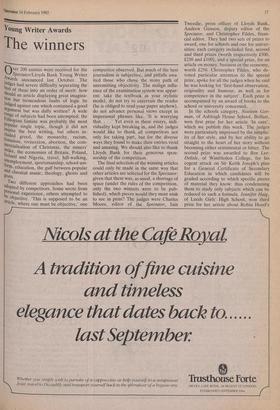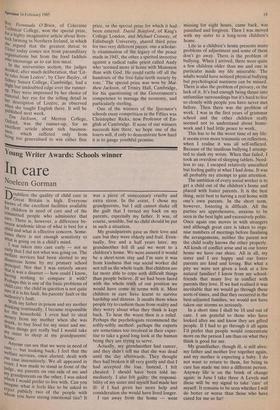Young Writer Awards
The winners
Over 200 entries were received for the Spectator/Lloyds Bank Young Writer Awards announced last October. The Judges had severe difficulty separating the best of these into an order of merit: how should an article displaying great imagina- !len but tremendous faults of logic be Judged against one which contained a good argument but was dully written? A wide range of subjects had been attempted: the Ethiopian famine was probably the most Popular single topic, though it did not Inspire the best writing, but others in- cluded greed, the monarchy, racism, Iennnism, vivisection, abortion, the com- mercialisation of Christmas, the miners' strike, the economies of Britain, Poland, Ireland and Nigeria, travel, hill-walking, linemployment, sportsmanship, school uni- 'arm, education, the gulf between popular and classical music, theology, ghosts and goats.
Two different approaches had been adopted by competitors. Some wrote from Personal experience, others attempted to be .objective. 'This is supposed to be an article, where one must be objective,' one competitor observed. But much of the best journalism is subjective, and pitfalls awa- ited those who chose the stony path of unremitting objectivity. The malign influ- ence of the examination system was appar- ent: take the textbook as your stylistic model, do not try to entertain the reader (he is obliged to read your paper anyhow), do not advance personal views except in impersonal phrases like, 'It is worrying that. . . .' Yet even in these essays, indi- viduality kept breaking in, and the judges would like to thank all competitors not only for taking part, but for the diverse ways they found to make their entries vivid and amusing. We should also like to thank Lloyds Bank for their generous spon- sorship of the competition. The final selection of the winning articles could only be made in the same way that other articles are selected for the Spectator: given that there was, as usual, a shortage of space (under the rules of the competition, only the two winners were to be pub- lished), which pieces would they most wish to see in print? The judges were Charles Moore, editor of the Spectator, lain Tweedie, press officer of Lloyds Bank, Andrew Gimson, deputy editor of the Spectator, and Christopher Fildes, finan- cial editor. They had two sets of prizes to award, one for schools and one for univer- sities: each category included first, second and third prizes (worth respectively £500, £250 and £100), and a special prize, for an article on money, business or the economy, worth £250. Christopher Fildes, who de- voted particular attention to the special prize, spoke for all the judges when he said he was looking for 'first-hand observation, originality and humour, as well as for competence in the subject'. Each prize is accompanied by an award of books to the school or university concerned.
In the schools category, Noeleen Gor- man, of Ashleigh House School, Belfast, won first prize for her article 'In care', which we publish this week. The judges were particularly impressed by the simplic- ity of her style, and by her ability to go straight to the heart of her story without becoming either sentimental or bitter. The second prize was awarded to Ben Lee- Delisle, of Wimbledon College, for his cogent attack on Sir Keith Joseph's plan for a General Certificate of Secondary Education in which candidates will be graded according to which specific pieces of material they know: thus condemning them to study only subjects which can be reduced to such a formula. Jennifer Haig, of Leeds Girls' High School, won third prize for her article about Robin Hood's Ray. Fionnuala O'Brien, of Coleraine Technical College, won the special prize, for a highly imaginative article about lives- tock farming in Northern Ireland, in which she argued that the greatest threat to Ulster today comes not from paramilitary organisations but from the food faddists who encourage us to eat less meat. In the universities section, the judges decided, after much deliberation, that 'Lit- tle tales from Lozere', by Clare Bayley, of Sidney Sussex College, Cambridge, had a slight but undoubted edge over the runner- uP. They were impressed by her choice of material, her eye for the telling detail in her description of Lozere, as observed when she taught English there. It will be Published next week. Tim Jackson, of Merton College, Oxford, was the runner-up, for an excellent article about rich business- men which suffered only from
tug too generalised to win either first
prize, or the special prize for which it had been entered. David Botsford, ,of King's College London, and Michael Conway, of Edinburgh University, shared third prize for two very different pieces: one a scholar- ly examination of the legacy of the peace made in 1945, the other a spirited invective against a radical radio priest called Andy who 'seemed more at home with Mammon than with God. He could rattle off all the handouts of the free-false-teeth society by rote.' The special prize was won by Mat- thew Jackson, of Trinity Hall, Cambridge, for his questioning of the Government's competence to manage the economy, and particularly sterling.
One of, the winners of the Spectator's schools essay competition in the Fifties was Christopher Ricks, now. Professor of En- glish at Cambridge. If none of our winners succeeds him there, we hope one of the losers will, if only to demonstrate how hard it is to gauge youthful promise.















































 Previous page
Previous page